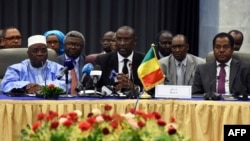The Mali government and rebel groups begin meetings Wednesday in Algiers to hash out a final peace arrangement a year after returning to democracy. The talks - which include African mediators - come amid this month's escalation of violence in the north, in violation of a May ceasefire. Meanwhile French President Francois Hollande is expected in West Africa later this week to flesh out his new counter-terrorism strategy in the Sahel - which will replace the current French troop presence in northern Mali.
Violent clashes and suicide attacks continue to plague northern Mali. This, despite French military intervention, elections and international mediation following a 2012 military coup which led to the country being torn apart by separatists.
In May, Mali's army suffered an embarrassing defeat at the hand of Tuareg separatists after an attempt to seize their stronghold Kidal. Last week more than 35 people were killed in clashes between the MNLA rebels, the National Movement for the Liberation of Azawad and the MAA, the Arab Movement of Azawad. On Monday a suicide attack against a French army patrol killed one soldier and injured six.
The talks in Algeria are the first real effort to bring Mali's factions together to draw a road map on how to resolve differences.
President Ibrahim Boubacar Keita has signalled he is willing to compromise, but has ruled out any final deal which threatens Mali's territorial integrity or secularism. To underscore this, al-Qaida-linked Islamist separatists groups - which occupied northern Mali in 2012 before being ousted by a French military offensive - have been excluded from negotiations.
Mediators from the African Union (AU) among other African groups will be facilitating these difficult talks.
Issaka Souare, the special adviser to the head of the AU mission, tolds VOA he is optimistic. "The African Union in conjunction with other regional [groupings like] ECOWAS [The Economic Community of West African States], the UN, the European Union and others will do everything they can to ensure that we reach a conclusive agreement at the end of this process," he said.
Meanwhile, France has announced an end to its 18-month military operation known as Serval which effectively reunited Mali but has not completely stabilized it. It will be replaced by a broader anti-terrorism operation in the Sahel region.
The new operation, called Barkhane, will involve security cooperation with Niger, Chad, Mali and other border nations. It will see some 3,000 French soldiers deployed - with at least a third of them remaining in northern Mali. It will also see France assist with drones, fighter jets and other military hardware.
Alain Antil heads the sub-Saharan Africa program for the French Institute for International Relations in Paris.
He said operation Barkhane uses French troops already in Mauritania, Mali, Niger and Burkina Faso. He says the new operation will give coherence to the French military presence in the Sahel and to the regional fight against terrorism.
French President Francois Hollande heads to West Africa Thursday with stops in Niger and Chad to hold talks with his counterparts on the operation.
